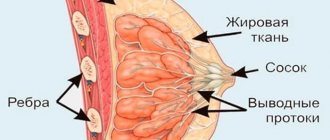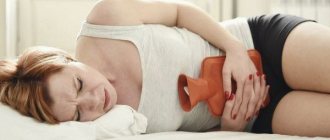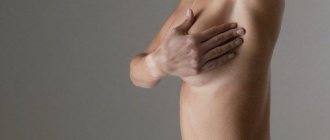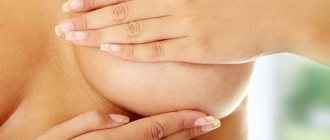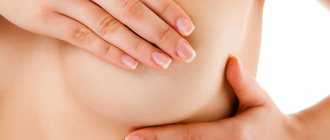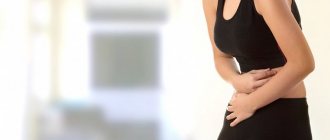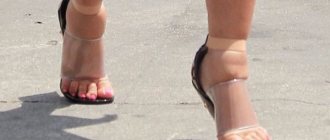At the beginning of pregnancy, especially at 1 month, many changes occur in the body. Swelling, tenderness and darkening around the nipples is considered one of the first signs of pregnancy, and the production of the hormone hCG causes the breasts to grow.
The reason for chest pain during pregnancy is that a large amount of gonadotropin, a hormone that affects the mammary glands, is released into the plasma. This sign of pregnancy appears in every fertilized woman before her expected period.
Other early manifestations are:
- small discharge of colostrum;
- increased blood circulation, as a result of which a venous pattern appears on the pregnant woman’s chest.
Often discomfort appears in the mammary glands before menstruation, similar to what is experienced with a fertilized egg. To stop breast discomfort before menstruation, magnesium supplements are taken in the second half of the cycle, which help cope with other premenstrual symptoms.
Why does pain occur and when will it stop? Is pregnancy possible without such manifestations?
How long do breasts hurt during pregnancy?
The beginning of pregnancy is an individual process, so pain is not the same for all women. Some people experience a slight tingling sensation for a short period of time, others experience hyper-sensitivity, and for some this problem is not relevant at all. Therefore, if the mammary glands during pregnancy do not react in any way to the changed state of the body, you should not immediately think about a violation. But you still need to visit a doctor.
Thousands of women are interested in one question: at what stage of pregnancy does breast pain stop? There is no definite answer due to the individuality of each organism. There is no need to worry if the pain disappears in the early or late stages of gestation, but to rule out any suspicions, it is necessary to undergo an examination.
In most cases, the discomfort goes away in the second trimester, thereby making it clear that the body is ready for feeding. But some women are bothered by their mammary glands throughout the entire period of bearing a child, and sometimes even after childbirth.
Why did my breasts suddenly stop hurting before my period?
For many women, painful sensations and slight discomfort in the mammary glands before menstruation are a common occurrence. Breast engorgement and other symptoms of PMS (premenstrual syndrome) usually appear a week before and disappear two days before your period.
The regularity of such changes and their constancy become commonplace for a woman during her reproductive period.
But if this sign of PMS suddenly disappears and your breasts stop hurting before your period, is this a reason to worry and see a doctor? Or excessive suspiciousness?
articles
- 1 Causes of pain
- 2 Pain disappeared: reasons
Causes of pain
Breast swelling and tenderness before menstruation are some of the common symptoms encountered in the so-called premenstrual syndrome or PMS.
Quite often, pain occurs with fibrocystic breast disease. In addition to pain, this disease is accompanied by the appearance of compaction in the gland tissue before the onset of menstruation.
At the end of menstruation, these symptoms resolve.
The cause of the phenomenon is female sex hormones. A week before your period starts, your body begins to produce a lot of estrogen and progesterone. The latter “forces” the woman’s body to accumulate fluid.
Rings, shoes or pants become tight, and extra water also causes breasts to swell.
Its tissues expand and begin to put pressure on the nerves, which causes pain and discomfort in the mammary glands.
Appearing at puberty, breast tenderness before menstruation recurs in many women “with enviable consistency.” But there are lucky women who have never experienced this “whim of nature” during their lives.
Chest pain associated with PMS varies in severity. They peak just before the onset of menstruation and then disappear during or immediately after menstruation.
When the cessation of pain is an alarming symptom
Women who closely monitor all the reactions of their body should know when their breasts stop hurting due to a threat to their health. For example, if the pain goes away in the early stages, this may be a sign of a frozen pregnancy and other unpleasant processes.
Frozen pregnancy
If the fetus has stopped developing, the female body does not produce progesterone, as a result of which the pain disappears, the glands become soft (women say that the breasts seem to have deflated). Pathology is possible during 8 months of gestation, but most cases are recorded in the first trimester.
A frozen form is also considered a condition when, after normal fertilization, the development of the embryo has stopped, extra-embryonic organs have formed, and there is no child in the egg. This phenomenon is called “empty fertilized egg.”
Fading occurs for many reasons, in some cases even specialists are unable to identify them.
Most often this happens:
- due to genetic disorders;
- hormonal imbalances;
- after IVF (artificial insemination);
- due to abuse of bad habits;
- for infectious and sexual diseases.
The condition can be triggered by heavy lifting, regular stress, and more.
Fetal death at an early stage can be determined by discharge, toxicosis, temperature and general condition.
However, even these signs are not a diagnosis, so it needs to be clarified or refuted by examination:
- Discharge. If the fetus dies, if a miscarriage does not occur in the first hours, the body begins to gradually get rid of the embryo. For the first 2 days, the woman may not notice any changes, then the decomposition of the fetus begins. After it peels off from the walls of the uterus, bloody threads can be seen in the discharge. After 14 days, the liquid becomes red-brown in color. The appearance of blood does not always indicate the death of the embryo; it may indicate detachment of a living fetus for other reasons.
- Toxicosis. Many women experience toxicosis in the early stages; the condition is associated with an increase in the blood of the hormone hCG in pregnant women. When freezing, the concentration decreases and after 4-5 days the vomiting disappears completely. It is worth noting that in most cases, closer to 4 months, toxicosis disappears on its own and this does not indicate the death of the embryo.
- Temperature. The decomposition process is characterized by jumps in basal temperature, but this does not always happen.
The symptoms that appear should be the reason for a mandatory gynecological examination, and to be sure of the diagnosis, an ultrasound scan is prescribed.
Risk of miscarriage
It happens that the pain disappears in the early stages due to the threat of miscarriage. Lack of hormones prevents the normal course of pregnancy. A large number of women face the risk, mainly occurring at 8 weeks, although the risk exists up to 12 weeks, and in late miscarriages up to 22 weeks.
If there is a high risk of miscarriage, the woman is monitored in a hospital; if the risk is insignificant, she is allowed to stay at home. If you consult a doctor when the first symptoms appear, then in most cases the pregnancy proceeds normally.
Spontaneous abortion in the early stages most often occurs due to abnormal development of the fetus; other reasons may be:
- inflammation of the uterus;
- hormonal disorders;
- infections.
The process can also be triggered by:
- some medications;
- caffeine;
- lack of folic acid;
- mechanical injuries;
- stress;
- artificial insemination;
- Rhesus discrepancies with the child's father.
There is also a risk group that includes women who are older, have two or more children, have had previous miscarriages, and lead an unhealthy lifestyle.
The main signs of a threat are the disappearance of discomfort in the mammary glands, the stomach begins to ache, radiating to the lumbar region, the pain is usually cramping and intensifying. Next, discharge appears, at first grayish with impurities of blood, after interruption it turns bright red. The hCG level begins to fall, which can be checked with a pharmacy test, where the second strip will become dim or disappear completely. Diagnosis is based on ultrasound, hormonal studies, vaginal smears and blood clotting tests.
Pituitary insufficiency
If a pregnant woman experiences problems with the pituitary gland, then by 2 months the breast pain stops completely. This means that there is a failure in the production of hormones by the pituitary gland, in particular prolactin, which is responsible for future lactation.
If, due to pituitary insufficiency, the mammary glands stop swelling, the pregnant woman needs to visit a gynecologist; ignoring the symptoms can lead to miscarriage, fetal pathologies, difficult labor and bleeding.
Manifestations of pituitary insufficiency are varied. It usually begins with sexual dysfunction - desire disappears, menstruation stops, breasts and labia atrophy. If a woman was pregnant during this period, and her breasts stop hurting and the sensitivity of the labia decreases.
Why do my breasts hurt before my period?
Attention!
Self-medication can be dangerous to your health.
The question of why breasts hurt before menstruation arises for many people. Sometimes the discomfort is so severe that a woman cannot perform her usual duties. But more often the pain is aching in nature and is associated with hormonal imbalance.
Should your breasts hurt before your period?
Not all women experience pain before menstruation. But, nevertheless, such discomfort is not considered pathological, so you need to understand why your chest hurts before your period.
Norm and pathology
After ovulation, the production of estrogen in a woman’s body increases. These hormones increase the volume of fatty tissue in the breast in order to prepare it for possible pregnancy. As a result, the sensitivity of the mammary glands increases, which provokes pain.
The intensity of painful sensations is always individual. Mild pain is considered normal. Their high intensity is a reason to consult a doctor, as this may be a symptom of the development of various pathologies.
Excruciating pain is provoked by improper functioning of the ovaries and hormonal imbalance in the body. In addition, they can be caused by various gynecological diseases and the development of mastopathy. Women at risk should pay attention to severe pain before menstruation.
You must be under the supervision of a doctor if you have:
- Gynecological pathologies.
- Inflammation of the mammary glands or organs that are located next to them.
- Breast diseases.
- Malignant and benign tumors.
- Cases of abortions or spontaneous terminations of pregnancy.
- Burdened heredity.
- Evidence of long-term use of oral contraceptives.
How many days before menstruation do “normal” pains appear?
The time at which pain occurs depends on the length of the cycle. As a rule, for most women it lasts 28 days. This means that ovulation occurs approximately 14 days before the start of your period. It is during this period that pain occurs and breast sensitivity increases.
What kind of pain does a girl most often experience?
Most often, pain in the chest before menstruation is aching in nature, but sometimes it is quite strong and covers the entire area of the mammary gland. In addition to pain, premenstrual syndrome is accompanied by irritability and mood instability. Such reactions of the body are associated with increased production of female hormones.
How many days do breasts usually hurt and become full?
Breast tenderness persists for approximately 2 weeks. The most severe discomfort is felt on the last day before menstruation.
As soon as menstruation occurs, the breasts immediately become softer and the pain begins to subside.
If this does not happen, the mammary glands hurt after the end of menstruation, it is necessary to undergo examination by a doctor, as this is evidence of the development of some pathology.
My breasts stopped hurting before my period - what does this mean?
As a rule, pain occurs in young girls experiencing hormonal changes due to the maturation of the body. But under the influence of any external factors, the pain may disappear.
It is not considered a pathology if this happened for the following reasons:
- beginning of sexual activity. This factor changes hormonal levels and can lead to breast pain no longer observed before menstruation;
- taking hormonal medications;
- stabilization of the menstrual cycle after full puberty;
- active sex life.
In addition, the breasts may stop hurting before menstruation if the pathological causes of discomfort have been eliminated.
For example, when mastopathy is cured or the functioning of the gastrointestinal tract is restored.
In addition, pain will decrease and even disappear if the nervous system is stabilized, if frequent stressful situations, weight loss diets, neuropsychic overload, etc. disappear from life.
Breasts hurt and become enlarged, but no periods
If your breasts hurt, but your period does not start, you should first suspect pregnancy.
If conception occurs, the sensitivity of the nipples increases and pronounced swelling of the mammary glands is observed. You can check this fact using a pregnancy test.
If it is negative, then it should be repeated after a couple of days. You can more accurately determine the fact of pregnancy by passing laboratory tests.
If pregnancy is not confirmed, it is imperative to look for the cause of the pathology. It can be quite serious.
The absence of menstruation due to chest pain can be caused by:
- hormonal imbalance;
- ectopic pregnancy;
- mastopathy;
- oncological processes.
Breast pain and absent periods can occur during puberty or at the onset of menopause. Sometimes the chest hurts, but there are no periods when the climate changes. As a rule, this syndrome is typical for weather-dependent women.
What to do if your breasts hurt a lot before menstruation
Of course, when your breasts hurt badly before your period, it is necessary to conduct an examination and identify provoking factors.
If no serious pathologies are found, then to reduce the intensity of pain you can use the following tips:
- Follow a special diet during the period of pain. Spicy and salty foods should be removed from the diet; you need to eat as many vegetables and fruits as possible. You should also limit your intake of strong tea and coffee.
- It is necessary to wear spacious and comfortable bras that have special support on the sides.
- You should not massage your breasts, as this will increase the intensity of the pain and may cause swelling.
- It is recommended to take painkillers only in extreme cases. At the same time, it is very important to prevent their overdose.
Magnesium preparations are effective means for relieving chest pain before menstruation. They are recommended to be taken approximately a couple of weeks before the start of menstruation. It is also recommended to take vitamin E every day. After about a month, you will feel significant relief.
How to reduce pain with folk remedies
There are many effective folk methods that are recommended for use when breasts hurt before menstruation. A vegetable compress is effective. It uses beets and cabbage leaves.
Raw beets are grated and a little honey is added to it, if there are no allergic reactions to this product. After this, the cabbage leaf is beaten to release the juice. Then he is placed on the sore chest and a beetroot-honey mixture is placed on it. This compress is covered with polyethylene and wrapped.
It has been proven that this procedure not only reduces pain, but also allows you to remove small lumps in the mammary gland.
Flaxseeds help normalize hormonal levels. To reduce painful sensations in the chest before menstruation, you need to grind the seeds and consume the powder one tablespoon 2 times a day, washing it down with plenty of water.
When your chest hurts before your period, you can relieve the pain with a soothing decoction of valerian, mint, fennel and cumin. To do this, all components must be taken in equal quantities and mixed. Then pour boiling water over one teaspoon of the mixture and leave to steep for half an hour. This is the daily dose. The strained and cooled broth should be drunk in 3 doses before meals.
Physical activity has a positive effect on chest pain. Swimming is considered especially beneficial. It is also recommended to engage in various types of fitness or at least brisk walking.
Traditional healers recommend that on the day when chest discomfort usually occurs, brew and drink chamomile tea with an apple and orange zest. This drink has anti-inflammatory and antispasmodic properties, it will help reduce the intensity of pain.
on this topic
Source: https://bolit.net/bol-v-grudi/84-pochemu-bolit-grud-pered-mesjachnymi.html
When should you see a doctor?
If chest pain suddenly disappears in any trimester, doctors recommend paying attention to the size and density of the mammary glands. If there is a reduction in size, it is strongly recommended to undergo an ultrasound.
Painful symptoms are not always considered normal. A sign of pathological processes is when only one breast hurts. Mandatory examination by a specialist is required for heavy purulent or bloody discharge from the nipples.
You should be wary if acute pain is present in a certain place, and hard lumps form. Symptoms may indicate mastopathy or tumor development. Pain under or in the middle of the breast often indicates heart problems. The intensity of pain is considered a sign of lactostasis (milk stagnation) or mastitis.
My breasts stopped hurting before my period, reasons and what to watch out for
The breasts stopped hurting because the amount of progesterone in the body decreases (stress, eating junk food) or due to the use of birth control pills. Sensations in the body are caused by hormonal changes, which can occur for several reasons:
- Eating junk food;
- Stress;
- Medical drugs;
- Far from a healthy lifestyle (smoking, drinking).
Women are sensitive to fluctuations in progesterone, a hormone produced by the ovary after ovulation. A decrease in the hormone leads to a decrease in sensitivity. She is very susceptible to taking birth control, if you stop taking it, ovulation will not occur and there will be no pain.
The most important information
The disappearance of the usual symptoms of ovulation may be due to:
- the appearance of regular sexual relations in life;
- hormonal disorders;
- tumor formations.
Soreness in the mammary glands before menstruation is a normal condition of the female body. Normally, the breasts begin to ache a few days before ovulation .
At this moment, the amount of endothelial tissue increases, which causes a feeling of compaction in the mammary glands.
The blood vessels fill and the glandular tissue grows, causing it to become heavy and swelling occurs.
With the onset of the calendar period of menstruation, all these changes disappear. Part of the overgrown endothelium gradually atrophies. However, a woman should clearly know at what time this happens.
Painful sensations in the chest during menstruation may indicate the occurrence of female diseases. Palpation of lumps in the area of the glands can be a sign of inflammation, the occurrence of a cancerous tumor, or malfunction of the ovaries. It is important not to miss this warning sign.
Causes of chest pain
Non-cyclical reasons:
- Psychological stress, lack of vitamins and nutrition.
- Mechanical injuries in the mammary glands affect the development of pain, which may coincide with the premenstrual period.
- Chest pain during and after menstruation may indicate that a hormonal imbalance has occurred. Painful sensations arose due to an increase or decrease in estrogen levels. This can lead to mastopathy.
- The use of hormonal drugs and contraceptive medications can cause pain.
- Before the onset of menopause. This period begins after 45 years or after 55 years. Menopause cannot occur at 30 or 20 years old; before the due date, a woman’s genitals are capable of reproduction.
- Beginning of pregnancy. In the first month of pregnancy, milk discharge - colostrum - may come from the nipples. This is a distinctive sign from the signs of the onset of the menstrual cycle.
- Tumor formations, breast pain at different periods of time, regardless of the female cycle. The occurrence of neoplasms is inflammatory in nature, the symptoms may be similar to a cold (fever).
Breast pain is one of the main symptoms of premenstrual syndrome (PMS). During the entire cycle, which lasts from 28 to 30 days, the condition of the glands changes. These changes occur in accordance with hormonal levels.
The process of ovulation rebuilds the female body and prepares it for the onset of pregnancy. The hormone progesterone, which increases many times during the ovulation phase, affects pain in the breast tissue. This hormone is involved in preparing the uterine layer for pregnancy and strengthening the embryo in it.
The steroid hormone estrogen promotes an increase in adipose tissue, increases the width of the mammary gland ducts, and participates in the formation of the uterine mucosa. It also causes, in increased concentrations in the blood, swelling of the breast. Prolactin affects the increase and production of milk in the glands.
After maturation, the egg enters the uterus and waits for union with sperm - pregnancy. If fertilization does not occur, with the onset of the menstrual cycle, the mucous layer of the uterus, along with the egg, is rejected and leaves the body with menstrual blood. During this period, all painful symptoms disappear and the cycle begins anew.
Symptoms
- Swelling and heaviness of the mammary glands during ovulation. Increased sensitivity of the breast to touch. Even gentle hugs with a partner cause discomfort. The skin on the chest becomes dense and rough to the touch.
- The skin around the nipples becomes dark. The nipples themselves become hard and sensitive.
- Painful symptoms have a constant course, sometimes intermittent. The pain can be dull and aching. When accompanied by pathological symptoms - burning, acute. Cyclic pain appears in both mammary glands and manifests itself in the same way.
- Non-cyclical ones can occur when choosing an uncomfortable bra.
Treatment
Non-steroidal and anti-inflammatory drugs are used to relieve premenstrual symptoms.
- Ibuprofen (Nurofen)
- Aspirin (Acetylsalicylic acid)
- Naproxen
These drugs can be bought at a pharmacy without a doctor's prescription.
Danazol, tamoxifen citrate are used in the treatment of particularly severe symptoms in the premenstrual period. These medications are prescribed under the strict supervision of a doctor, as they have a number of side effects.
Birth control medications may also relieve pain symptoms, temporarily. However, they have side effects.
Taking vitamin B6 or magnesium will not only help relieve cyclic pain, but also prevent nervous stress.
During the premenstrual period, doctors advise wearing a sports bra. A comfortable bra can support heavy breasts while moving. Prevents sagging and subcutaneous stretch marks.
At this time, alcohol and fatty foods should be excluded from the diet. Drinking strong coffee further dilates blood vessels throughout the body and further increases blood flow to the mammary glands.
When to go to the doctor
If there are sudden changes in the sensations of the mammary glands before menstruation, this is a signal to go to the doctor. Warning symptoms of infection and neoplasm may be less noticeable pain and an increase in pain before menstruation. It is worth visiting a doctor if you notice:
- New sensations or changes in the mammary glands.
- Discharge from the nipples, especially if the discharge is brown or bloody. Signs of a disease such as mastopathy.
- If chest pain is preventing you from sleeping or doing housework.
- Unilateral manifestation of pain. Painful sensations appear in only one breast.
The doctor will do a physical examination, including a breast exam, and ask you to describe in more detail the sensations that are causing you concern. The doctor may ask:
- Is there any discharge from the nipples?
- What new symptoms have appeared and the anxiety you are experiencing?
- Pain and enlargement in the mammary glands occurs at the same time, every menstrual period
Your doctor can also show you how to do a breast exam yourself at home.
If, during the examination, the doctor detects structural changes in the tissues (especially the area of the lymph nodes) or abnormal compaction, he will ask you to undergo a mammogram (or ultrasound diagnostics if your age does not exceed 35 years). A biopsy is required (a piece of tissue, a sample surgically removed from the mammary glands), to test for the occurrence of a malignant tumor.
Lifestyle affects pain
During the premenstrual period, it is recommended to wear a comfortable bra at night, this will provide additional support for the mammary glands. If pain symptoms worsen, change your regular bra to a more stretchable sports bra.
But it is worth remembering that this type of underwear can quickly become deformed and lose shape due to the load on the breasts. Sports bras should be replaced periodically with new ones. The same rule applies to young girls over 15 years old whose mammary glands are not fully formed and are still growing.
As your period approaches, you should adjust your diet, consider and choose a vitamin kit. Avoid not only fatty foods, but also salty foods. It is recommended to take vitamin E (400 units), magnesium 400 mg.
The following products should be included in the diet:
- peanuts, hazelnuts
- spinach
- corn, sunflower, olive oil (rich in vitamin E)
- carrots, bananas, avocado
- oat bran
- brown rice
When visiting, the doctor may prescribe a special vitamin complex in addition. Self-examination of the breast at home helps to monitor all changes in breast tissue. Doctors recommend doing your own breast examination once a month in front of a mirror.
The passage of the cycle raises various questions and experiences in the fairer sex, especially the discomfort felt inside. Every month there are several days in which the possibility of becoming pregnant increases to 100%, and this leads to increased sensitivity. Moreover, each female representative has different symptoms, and menstruation can pass with absolutely no discomfort.
Source: https://zenmd.su/perestala-bolet-grud/
How to reduce pain - doctor's recommendations
If a woman regularly follows medical recommendations, the pain will disappear completely or its intensity will decrease. It is recommended to rub and massage the mammary glands, but at the 3rd month you should stop these procedures or carry them out with caution, otherwise you can provoke premature birth.
Hardening and air baths are considered good prevention of lactational mastitis. Specially selected gymnastics will help reduce pain.
Other recommendations:
- It is important to wear high-quality underwear that fits properly, with wide straps, without unnecessary seams or inserts, and made from natural material.
- Every day, several times you need to rinse the mammary glands with warm water without detergents.
- To reduce or eliminate pain, doctors recommend drinking plenty of fluids; tea with ginger and chamomile, coconut water, warm milk with honey will be especially beneficial.
- To stop your breasts from hurting due to their growth and to have fewer stretch marks, use a special cream to moisturize your skin from the very beginning of pregnancy.
To preserve the health of future offspring, a woman must give up bad habits long before conception and stop eating fatty foods and fast food. She needs to take vitamins and minerals, walk more and rest, only then will she have a high chance of a healthy pregnancy.
About preparing your breasts for feeding - in this video:
My breasts stopped hurting before my period
June 28, 01:07
Chest before delay
During your pregnancy cycle, whoever had breast pain that stopped hurting before your period, but eventually found out that you were pregnant??? And in general, how did your breasts behave before and after the delay? Continue reading →
My chest stopped hurting a few days before M.
Good afternoon girls. My breasts are behaving strangely this cycle. She started to get sick immediately after O., and this was 3-4 days earlier than usual, and she was very sick, like before the start of her period, and now before M.
At least another 3-4 days, and she stopped getting sick, although she usually stops getting sick with the arrival of M. And another strange symptom, for the past three days, after lunch and until the evening, I’ve been very thirsty, I’ve been drinking and not getting drunk...
Continue reading →
breasts when planning for 21 DC
Hi all! girls, tell me whose breasts swell before menstruation and then deflate.
The question is this: if conception has occurred, then the breasts do not deflate, but continue to swell or first subside, and if menstruation has not begun, they swell again.
I have a cycle of 31 days after ovulation, my breasts began to swell and my nipples hurt, and today I am 22DC and my breasts have stopped growing and my nipples are not so sensitive, which means that my period will start in 10 days as usual Read more →
Question
The M girls should be here soon, yesterday my stomach ached on the sides, and my chest stopped hurting! Usually this means for me that my period will start any minute, but it’s not there, my stomach no longer pulls, my chest doesn’t hurt, if only slightly from below when pressed, did that happen to you? during the pregnant cycle Read more →
Breast !
Girls, how do breasts behave during pregnancy? What you are interested in is whether it hurts or not, whether it stops or starts to hurt more by day x! My chest hurt for two days, now the pain has begun to subside...
What's this ?? The BT schedule leaves hopes for pregnancy, but what about breasts? Why does she stop getting sick? Usually I feel like this in front of monsters... When they come, my chest stops hurting in a matter of hours, as if everything was pouring out of my breasts...
Continue reading →
Why did my breasts stop hurting before my period?
My breasts always hurt before my period. From the very beginning until recently, this was the norm for me. Even after the birth of two children, my situation has not changed. Well, in principle, these painful sensations did not cause me much discomfort.
And doctors always said that this was within the normal range. But now, within six months, everything has changed. And I think this was preceded by a forced termination of pregnancy. As a result, I began to be bothered by the question, why did my breasts stop hurting before my period? At first...
Continue reading →
Yesterday was X day.
No periods. My stomach doesn't feel tight at all. At 9dpo I had some brown discharge. Then my chest began to hurt in my armpits. Very strongly (Yesterday my chest stopped hurting. There was no discharge. Everything was calm))) The test yesterday was empty. For a year there were never any delays, sometimes they even arrived a day earlier) Virgos, who has had this happen?? It was the chest that stopped hurting and hiiiiiiinaaa
Source: https://www.BabyBlog.ru/theme/grud-perestala-bolet-pered-mesyachnymi
